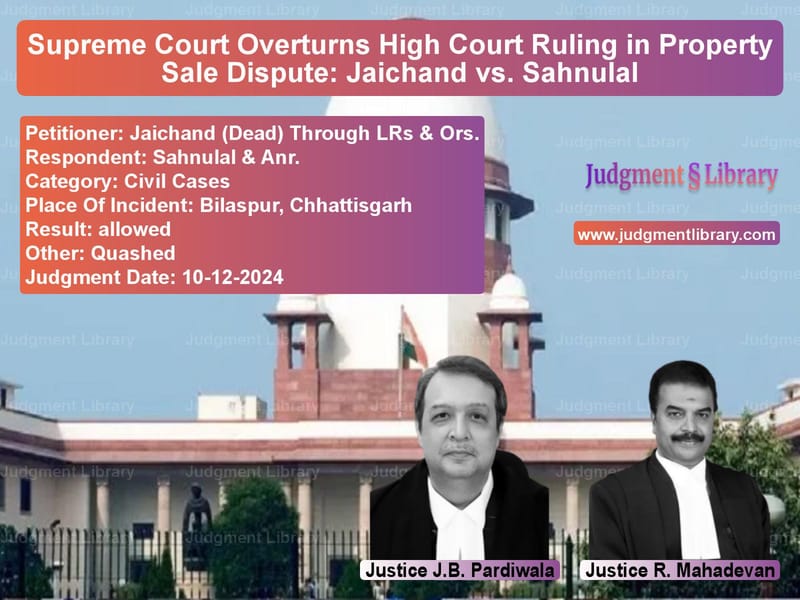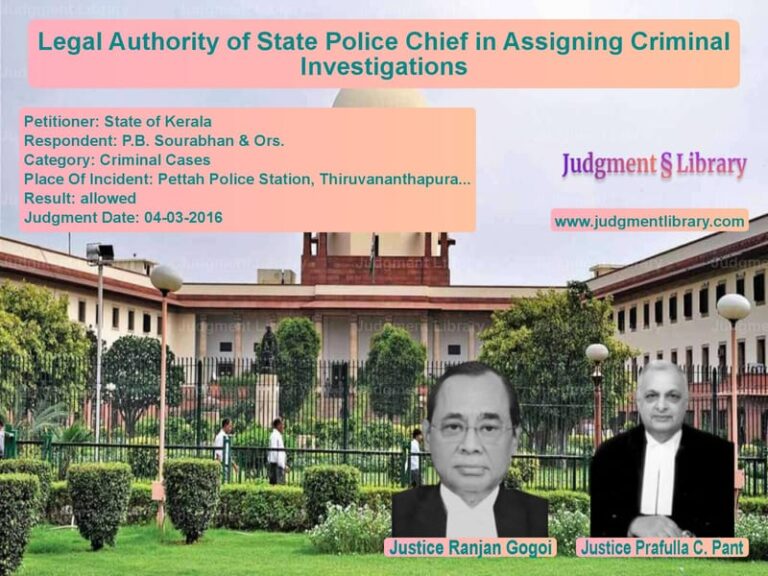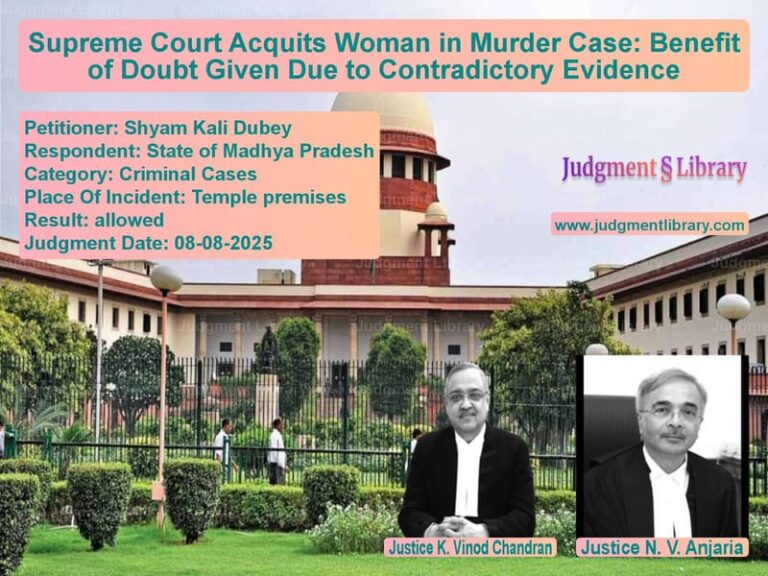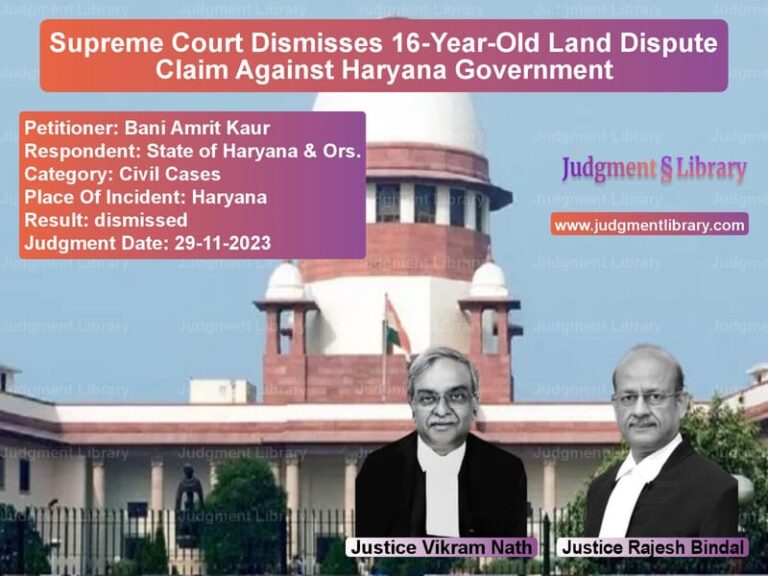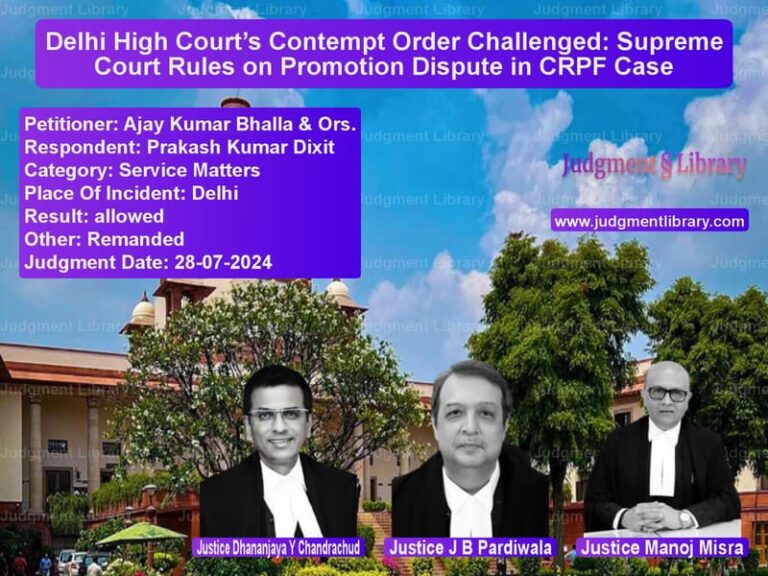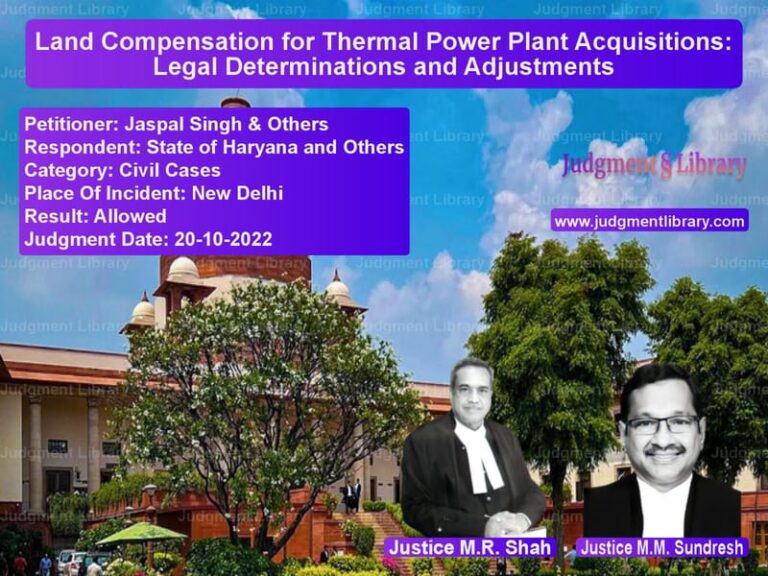Supreme Court Overturns High Court Ruling in Property Sale Dispute: Jaichand vs. Sahnulal
The Supreme Court of India has set aside a judgment by the Chhattisgarh High Court in a long-standing property dispute, ruling in favor of the legal heirs of the original defendant, Jaichand. The case revolved around a sale agreement executed in 1996, which the plaintiffs sought to enforce through a suit for specific performance. The Supreme Court found that the High Court erred in reversing the first appellate court’s well-reasoned judgment, which had denied specific performance due to the plaintiff’s lack of readiness and willingness.
Background of the Case
The case concerns a disputed land transaction involving Khasra No. 111/3, measuring 0.238 hectares in Village Parsahi, District Bilaspur. The original defendant, Juglal, entered into an agreement to sell the property to the plaintiffs on April 28, 1996. The key terms of the agreement were:
- Sale consideration: Rs. 50,000 per acre
- Advance payment: Rs. 6,000
- No fixed deadline for execution of the sale deed
However, the plaintiffs did not take any legal action until 2001, claiming that they only realized then that the defendant was unwilling to complete the transaction. They filed a suit for specific performance in 2003.
Trial Court Decision
The trial court ruled in favor of the plaintiffs, granting specific performance. The judgment was based on the findings that:
- The agreement was valid and enforceable.
- The defendant had received Rs. 6,000 as earnest money.
- The suit was not barred by limitation.
The court directed the defendants to execute the sale deed within two months, failing which the plaintiffs could get it executed through the court.
First Appellate Court’s Ruling
The defendants challenged the trial court’s decision in the Court of the District Judge, Balasore. The first appellate court set aside the specific performance decree and instead ordered a refund of the earnest money. The court held that:
- The plaintiffs had shown no urgency in enforcing their rights, waiting five years before issuing a notice and seven more months before filing the suit.
- There was a lack of readiness and willingness on the part of the plaintiffs.
- The long delay cast doubt on whether they had the financial capacity to complete the sale.
- Instead of specific performance, returning the earnest money was a more appropriate remedy.
High Court’s Reversal
The plaintiffs then filed a second appeal before the Chhattisgarh High Court under Section 100 of the Civil Procedure Code (CPC). The High Court reinstated the trial court’s judgment, ruling that the first appellate court erred in denying specific performance. It concluded that:
- The defendant had not specifically pleaded hardship under Section 20(2)(b) of the Specific Relief Act, 1963.
- The first appellate court could not raise hardship as a ground in the absence of such a plea.
- The delay in filing the suit did not justify denial of specific performance.
Supreme Court’s Examination
The Supreme Court, comprising Justices J.B. Pardiwala and R. Mahadevan, ruled in favor of the defendants, overturning the High Court’s decision. The key findings of the Supreme Court were:
1. High Court Misinterpreted the Appellate Court’s Reasoning
The Supreme Court noted that the first appellate court had not relied solely on hardship to deny specific performance. Instead, it had also questioned the plaintiffs’ lack of urgency and financial preparedness, which were valid grounds for denial.
2. Readiness and Willingness Are Essential for Specific Performance
The Court emphasized that under the Specific Relief Act, 1963, a plaintiff seeking specific performance must prove continuous readiness and willingness to perform their part of the contract.
“If the plaintiff was actually ready to register the sale deed, the suit should have been filed immediately after the refusal by the defendant in 2001, but they waited another two years.”
3. High Court’s Intervention Was Unwarranted
The Supreme Court criticized the High Court for interfering with a well-reasoned judgment of the first appellate court. It reaffirmed that under Section 100 CPC, a second appeal is only permissible if there is a substantial question of law, which was lacking in this case.
“The High Court should not reappreciate the evidence to reach another possible view in order to set aside the findings of fact arrived at by the first appellate court.”
Final Judgment
The Supreme Court ruled:
- The High Court’s judgment was set aside.
- The first appellate court’s ruling was restored.
- The plaintiffs’ claim for specific performance was dismissed.
- The defendants were ordered to refund Rs. 3,50,000 to the plaintiffs within eight weeks. If they failed to do so, the trial court’s decree for specific performance would be reinstated.
Implications of the Judgment
The Supreme Court’s ruling has significant implications for property litigation and specific performance suits:
1. Reinforcement of Readiness and Willingness Principle
The judgment reinforces that plaintiffs in specific performance cases must show continued readiness and willingness throughout.
2. Clarification on High Court’s Role in Second Appeals
The ruling limits the High Court’s ability to interfere with first appellate court decisions unless a substantial question of law is involved.
3. Protection Against Delayed Enforcement
The decision ensures that defendants are not forced to complete transactions where plaintiffs have been inactive for an extended period.
Conclusion
The Supreme Court’s ruling in Jaichand (Dead) Through LRs & Ors. vs. Sahnulal & Anr. is a crucial precedent in specific performance cases. By restoring the first appellate court’s judgment, the Court reaffirmed the principle that mere existence of an agreement does not guarantee enforcement—plaintiffs must demonstrate continuous readiness to perform their part. The ruling also serves as a reminder that second appeals cannot be used to reexamine factual determinations without a substantial legal question.
Petitioner Name: Jaichand (Dead) Through LRs & Ors..Respondent Name: Sahnulal & Anr..Judgment By: Justice J.B. Pardiwala, Justice R. Mahadevan.Place Of Incident: Bilaspur, Chhattisgarh.Judgment Date: 10-12-2024.
Don’t miss out on the full details! Download the complete judgment in PDF format below and gain valuable insights instantly!
Download Judgment: jaichand-(dead)-thro-vs-sahnulal-&-anr.-supreme-court-of-india-judgment-dated-10-12-2024.pdf
Directly Download Judgment: Directly download this Judgment
See all petitions in Contract Disputes
See all petitions in Property Disputes
See all petitions in Specific Performance
See all petitions in Judgment by J.B. Pardiwala
See all petitions in Judgment by R. Mahadevan
See all petitions in allowed
See all petitions in Quashed
See all petitions in supreme court of India judgments December 2024
See all petitions in 2024 judgments
See all posts in Civil Cases Category
See all allowed petitions in Civil Cases Category
See all Dismissed petitions in Civil Cases Category
See all partially allowed petitions in Civil Cases Category

